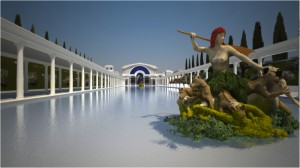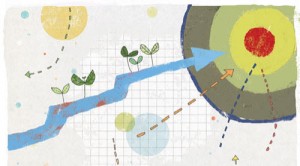2012 October
October 24: Bernard Frischer on “Modeling the Past: New Projects of The Virtual World Heritage Laboratory”
On 08, Oct 2012 | In Meetings, Video | By Charlie Edwards
Please join the CUNY Digital Studies/Digital Humanities Seminar on Wednesday October 24 when we will welcome Bernard Frischer, Director of the Virtual World Heritage Laboratory at University of Virginia, to discuss the VWHL’s work modeling Hadrian’s Villa, a World Heritage Site. The villa is being recreated in 3D by the VWHL and used as a test-bed for experiments in Roman cultural geography.
The video of this even can be accessed here:
Thank you to the CUNY Graduate Center Videography Fellows Program for their work on this video (link here: http://youtu.be/LAk-iSrcnVg)
“Modeling the Past: New Projects of The Virtual World Heritage Laboratory”
Bernard Frischer (University of Virginia)
Co-Sponsored by the M.A. Program in Liberal Studies
Wednesday October 24, 2012, 6:30pm-8:30pm
Room C201/202, CUNY Graduate Center
With generous funding from an anonymous donor and the National Science Foundation, and in close cooperation with the Soprintendenza per i Beni Archeologici del Lazio, an international team has been creating a restoration model of Hadrian’s Villa, a World Heritage Site, and the best-preserved imperial villa in the hinterland of Rome. The model includes terrain, gardens, water features, sculpture, buildings, furnishings, and avatars representing members of the imperial court. The IDIA Lab at Ball State University, a partner in the project, has taken the 3D model and ported it to the game engine Unity3D, so that it is possible to explore the reconstructed villa interactively over the Internet. This talk will present the project, its history, goals, current state, and future prospects.
Bernard Frischer is Director of the Virtual World Heritage Laboratory, University of Virginia. A leading digital humanist, he is the author of several books, including Shifting Paradigms: New Approaches to Horace’s Ars Poetica, and The Sculpted Word: Epicureanism and Philosophical Recruitment, and dozens of articles on virtual heritage, classics, and the survival of the classical world. In 2005, Frischer was given the Pioneer Award of the International Society on Virtual Systems and Multimedia. In 2009, he was the recipient of the Tartessus Lifetime Achievement Prize from the Spanish Society of Virtual Archaeology, and in 2010-11 he held the Senior Prize Fellowship of the Zukunftskolleg at the University of Konstanz.
Many thanks to the Center for the Humanities for sponsoring the CUNY Digital Studies/Digital Humanities Seminar series of events.
October 4: Seminar Meeting & Provost’s Digital Innovation Grant Showcase
On 01, Oct 2012 | In Meetings | By Charlie Edwards
Please join the CUNY Digital Studies/Digital Humanities Seminar this Thursday October 4, 2012 for our first meeting of the Fall 2012 semester. We will discuss plans for the upcoming year and winners of the Provost’s Digital Innovation Grants will present their project work to date. This newly-launched award supports innovative digital projects designed, created, programmed, or administered by doctoral and master’s students at the CUNY Graduate Center.
The event is free and open to the public. We look forward to seeing you there!
Thursday, October 4, 2102, 6:30pm-8:30pm
Room C205, CUNY Graduate Center
Seminar Meeting & Provost’s Digital Innovation Grant Showcase
Sharing their work will be:
Naomi Barrettara (Musicology): The Open Music History Project
The Open Music History Project will be an open music history “textbook,” designed to ultimately be an interactive, flexible, adaptable, affordable, and freely available online resource for teachers and students of western music history.
Amanda Licastro (English): The Writing Studies Tree
The Writing Studies Tree is an online, open-access, crowd-sourced database of scholarly relationships within writing studies, composition/rhetoric and related academic fields. The other members of the team are Ben Miller (English) and Jill Belli (Assistant Professor, English, City Tech).
Micki Kaufman (U.S. History): “Data Mining Diplomacy”: A Computational Analysis of the State Department’s Foreign Policy Files
This research project is an application of big data computational techniques like those employed by Michel et al. (“Culturomics: Quantitative Analysis of Culture Using Millions of Digitized Books”) and Nelson (“Mining the Dispatch”) to the study of diplomatic history.
Jacob Lederman (Sociology): Urban Sociology Digital Mapping and Presentation Tool
This project proposes creating a collaborative, customized Google mapping tool to be housed on an urban sociology class portal where students can upload data, photos, and systematic observations to generate a living, interactive “quilt” or patchwork of social scientific knowledge on various neighborhoods of the city.
Antonia Santangelo (Anthropology): The Black Sea Fish and Mollusca Project
The Black Sea Fish and Mollusca Project employs Omeka, an open source web-publishing platform for the display of library, museum, archives, and scholarly collections and exhibitions, to showcase a physical comparative collection of fish skeletons and mollusc shells from the Black Sea coastal regions of Bulgaria, Turkey, Romania, Ukraine, Russia and Georgia.
Rondi Silva (Urban Education): Debunking the “Dropout” Stereotype
This multi-modal study aims to challenge conventional views of “dropping out” and “dropouts” using video modules co-created and curated by its youth participants.



 Welcome to the blog of the CUNY DHI, an effort to build momentum and community around Digital Humanities practitioners at CUNY. We hope you'll join us at our upcoming events and that you'll follow this blog to hear about the latest news in the field.
Welcome to the blog of the CUNY DHI, an effort to build momentum and community around Digital Humanities practitioners at CUNY. We hope you'll join us at our upcoming events and that you'll follow this blog to hear about the latest news in the field.



Recent Comments